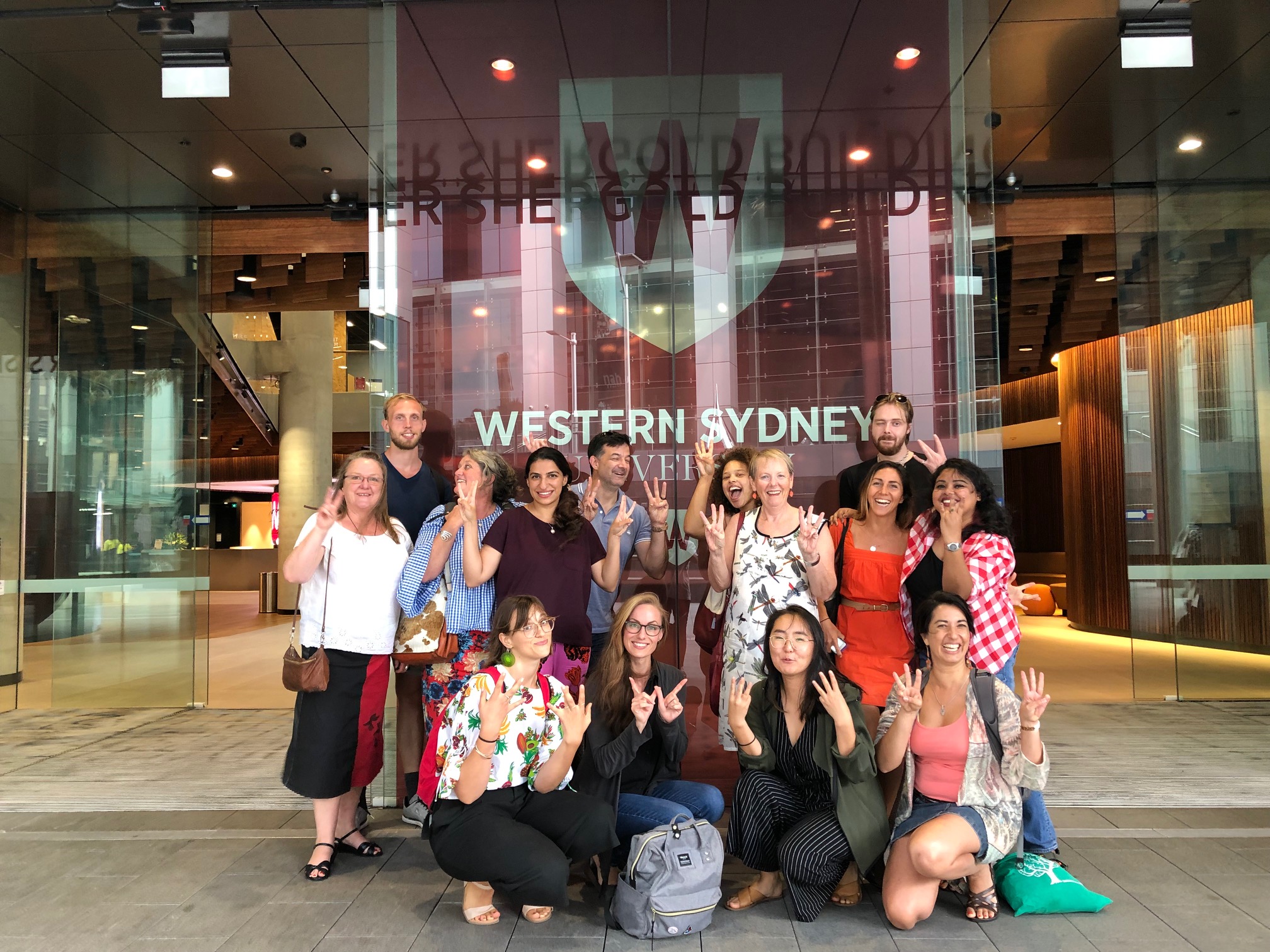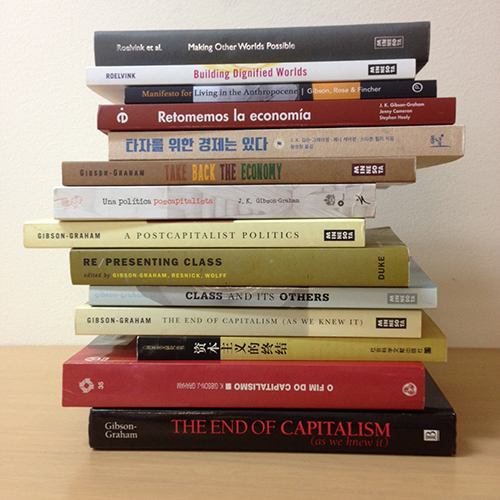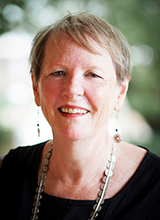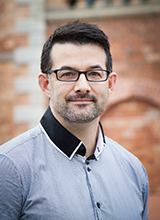Researching Post-Capitalist Possibilities 2020
PhD Short Course and One Day Conference
January 2020 in Sydney, Australia
Hosted by the Community Economies Strategic Initiative, Institute for Culture and Society, Western Sydney University
PhD Short Course Details
Taught by: Katherine Gibson, Stephen Healy and members of the Community Economies Collective and Research Network
When: Wednesday 15 - Friday 17 and Monday 20 - Wednesday 22 January 2020 (6 days)
Where: Western Sydney University, Parramatta City Campus
Cost: $1,500 (Early bird price $1,300)
Registration: please submit your Expression of Interest (opens in a new window) by 27 September 2019.

One Day Conference Details - Beyond Business as Usual
When: Thursday 23 January 2020
Time: 9.00am - 4.30pm, Thursday 23 January 2020
Venue: Female Orphan School, Parramatta South Campus, Western Sydney University, Corner James Ruse Drive & Victoria Road, Rydalmere.
Register: on Eventbrite (opens in a new window)(free)
In this one-day conference we will hear from researchers, enterprises and artists involved in efforts at transforming business as usual. The backdrop for the conference is the way in which ecological challenges associated with the Anthropocene have created a general recognition that Business as Usual cannot go on while transformative global policy initiatives like the Sustainable Development Goals invite us to do things differently. But what might that mean?

PhD Short Course Overview
What role can the humanities and social sciences play in making other worlds possible?
What capacities do we have as scholars to shape the world?
What ethical responsibilities and earthly cares come with this work?
These are difficult questions. The answers we might give benefit from collective thinking and learning. Researching Post-Capitalist Possibilities is a short course that offers PhD students and early career researchers (ECRS) the opportunity to explore these questions with scholar members of the Community Economies Collective who have been thinking outside or beyond capitalist relations since the publication of J.K. Gibson-Graham’s The End of Capitalism (As We Knew It): A Feminist Critique of Political Economy in 1996.
Course Overview
The first three days of the course will explore the conceptual foundations of feminist post-capitalist thinking. The second three days will focus on how to imagine and enact post-capitalist possibilities through research practice. Prior reading preparation will be required. In addition to key works by J.K. Gibson-Graham and CEC scholars on the Diverse Economy and Community Economies, readings and lectures will engage with other contemporary approaches that are working at the frontiers of socio-political thought including: material semiotics, post-development, ecological humanities, resilience theory, psychoanalytic theory, assemblage politics and commoning. This six day intensive will provide early stage PhD students with a demanding immersion in social theory debates. For more advanced doctoral scholars and ECRs it offers the opportunity to clarify and refine their research contribution. Sessions will combine lectures, small group discussions, fishbowl discussions, walking seminars and collaborative exercises. The course leaders are co-editors of the University of Minnesota Press Book Series Diverse Economies and Liveable Worlds and will offer one session focused on conversion of theses into books.
PhD Short Course Convenors
The short course will be run by Professor Katherine Gibson and Dr Stephen Healy with input from other members of the Community Economies Collective.
Professor Katherine Gibson
 Professor Katherine Gibson is internationally known for her research on rethinking economies as sites of ethical action. She trained as a human geographer with expertise in political economy and, with her collaborator for over 30 years, the late Professor Julie Graham, developed a distinctive approach to economic geography drawing on feminism, post-structuralism and action research. The diverse economies research program they initiated has become a vibrant sub-field of study within the social sciences. In the late 1990s the collective authorial voice of J.K. Gibson-Graham led the critique of capitalocentric thinking that was blocking the emergence of economic possibility. The end of capitalism (as we knew it): a feminist critique of political economy published in 1996, was republished in 2006 with a new Introduction and named a Classic in Human Geography by the leading journal Progress in Human Geography in 2011.
Professor Katherine Gibson is internationally known for her research on rethinking economies as sites of ethical action. She trained as a human geographer with expertise in political economy and, with her collaborator for over 30 years, the late Professor Julie Graham, developed a distinctive approach to economic geography drawing on feminism, post-structuralism and action research. The diverse economies research program they initiated has become a vibrant sub-field of study within the social sciences. In the late 1990s the collective authorial voice of J.K. Gibson-Graham led the critique of capitalocentric thinking that was blocking the emergence of economic possibility. The end of capitalism (as we knew it): a feminist critique of political economy published in 1996, was republished in 2006 with a new Introduction and named a Classic in Human Geography by the leading journal Progress in Human Geography in 2011.
Gibson-Graham's work on a post-capitalist economic politics has had a widespread readership among those interested in economic alternatives and has been translated into Portuguese, Chinese, Korean, Turkish, Finnish, Spanish and French.
Dr Stephen Healy
 Stephen Healy is a Senior Research Fellow at ICS. His research has concentrated on the relationship between economy, subjectivity and the enactment of new econo-socialities exploring various topics: health care reform policy, cooperative and regional development, and the solidarity economy movement. In each instance his abiding concern has been to apply insights from Marxian and psychoanalytic theory to understand the desires, fantasies and anxieties that compose the restive human subject. His current ARC project, with CIs Katherine Gibson, and Jenny Cameron, Reconfiguring the Enterprise: Shifting Manufacturing Culture in Australia (DP160101674) is a case study driven approach to reimagining the future of manufacturing in Australia. He is co-author of Take back the economy: an ethical guide for transforming our communities (UMP 2013), presently translated into Korean, Spanish and Finnish with planned translations into Greek and French. Stephen has been published in Antipode, Journal of Design Studies, Gender, Place and Culture, Professional Geographer, New Zealand Geographer, Journal of Political Ecology and Rethinking Marxism and elsewhere in addition to contributing to numerous edited volumes. Stephen is a founding member of the Community Economies Research Network (opens in a new window).
Stephen Healy is a Senior Research Fellow at ICS. His research has concentrated on the relationship between economy, subjectivity and the enactment of new econo-socialities exploring various topics: health care reform policy, cooperative and regional development, and the solidarity economy movement. In each instance his abiding concern has been to apply insights from Marxian and psychoanalytic theory to understand the desires, fantasies and anxieties that compose the restive human subject. His current ARC project, with CIs Katherine Gibson, and Jenny Cameron, Reconfiguring the Enterprise: Shifting Manufacturing Culture in Australia (DP160101674) is a case study driven approach to reimagining the future of manufacturing in Australia. He is co-author of Take back the economy: an ethical guide for transforming our communities (UMP 2013), presently translated into Korean, Spanish and Finnish with planned translations into Greek and French. Stephen has been published in Antipode, Journal of Design Studies, Gender, Place and Culture, Professional Geographer, New Zealand Geographer, Journal of Political Ecology and Rethinking Marxism and elsewhere in addition to contributing to numerous edited volumes. Stephen is a founding member of the Community Economies Research Network (opens in a new window).
Learning Outcomes
By the end of the short course participants will be able to:
- Articulate key ideas of Marxist political economy and feminist poststructuralism
- Situate their research within current theoretical debates about economic and ecological futures
- Use critique to open up pathways for enabling research
- Design research strategies for making other worlds possible
Testimonials from past Short Course Participants
“The Summer School is a unique opportunity to think, learn and grow together with critical researchers from around the world. Stephen, Kath and Jenny fostered a supportive yet challenging environment to explore a mix of relevant literature, media and culture, and our own research”.
“The summer school was thought provoking, engaging and fun! It made me think about my research in a transformative light and how it can open up possibilities for a more ethical society.”
“You will work in an inclusive yet challenging environment to learn new ideas and expand your thinking. You have the chance to learn conceptual theoretical perspectives as well as methods and methodology”.
“This is a great opportunity to share your research ideas in a professional yet friendly environment. It offered an experience you would not otherwise be able to get.”
Fees and Accommodation
The fee for the six day short course is $1,500 (early bird rate is $1,300).
The fee covers:
- The Short Course chool course
- Access to all readings and course related material
- Daytime catering
- One group dinner out in Sydney
- Registration for the one day Conference that follows the Short Course on the 24th January
All participants will be responsible for arranging and paying for their own travel and accommodation, as well as for arranging visas if required. There is a range of affordable accommodation options, both on and close to the Parramatta City and South campuses. Specific information on accommodation options will be provided to successful applicants later in the process.
How to Apply
Please submit your Expression of Interest (opens in a new window) by 27 September 2019. Applications are open to currently enrolled PhD candidates and early career researchers (no more than 5 years out from PhD).
Course credit option available, please contact Stephen Healy (stephen.healy@westernsydney.edu.au) for more information.
Please note that the course will be limited to 18 places. We will aim for a diverse mix of participants by topic of interest, geographical origin and stage of research development.
Key Dates
- Expressions of Interest close: Friday, 27 September 2019
- Successful Applicants notified: Monday, 7 October 2019
- Early bird registration and payment due: Friday, 15 November 2019
- Final registration and payment due: Tuesday, 31 December 2019
- Short Course: 15-17, 20-22 January 2020
- One Day Conference: 23 January 2020
Prior Required Reading
J.K. Gibson-Graham, J, Cameron and S, Healy 2013 Take Back the Economy: An Ethical Guide For Transforming Our Communities Minneapolis: University of Minnesota Press.
Other Preparation
A 10 minute presentation on your research topic highlighting its theoretical engagement.
Useful Information for Your Visit
Getting to Parramatta City Campus
The Western Sydney University Parramatta City campus is located at 169 Macquarie Street, Parramatta NSW 2150. The building is indicated by the number 1 on the Parramatta City map (PDF, 563KB) (opens in new window),
The train ride from Sydney CBD to Parramatta is approximately 30 minutes, with frequent trains daily. Parramatta is one hour by ferry to Circular Quay and the Opera House.
Public transport: You can use the Transport NSW (opens in a new window)Trip Planner to plan your trip by train, ferry or bus. The most direct route from Sydney CBD is by train to Parramatta station. The train ride from Sydney CBD to Parramatta is approximately 30 minutes, with frequent trains daily. Parramatta is one hour by ferry to Circular Quay and the Opera House.
See the Transport NSW website for information on the Opal (opens in a new window)ticketing system.
Walk: The Parramatta City campus at 169 Macquarie Street, Parramatta is less than a five minute walk from Parramatta train station.
Drive: Parking bays are not available at the building as the Parramatta City campus facilities are located in the heart of the Parramatta CBD with no available land to accommodate parking. View the Parramatta City map (PDF, 563KB) (opens in new window) for parking options in this area.
Sydney Activities
January is midsummer in Australia.
The Sydney Festival (opens in a new window)takes place in January.
Destination NSW (opens in a new window)provides information on things to do in the state and accommodation options.
Entering Australia
Department of Immigration and Border Protection (opens in a new window)(visa information)
Department of Agriculture and Water Resources (opens in a new window)(information on biosecurity when travelling to Australia)